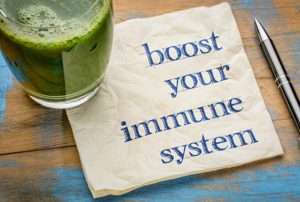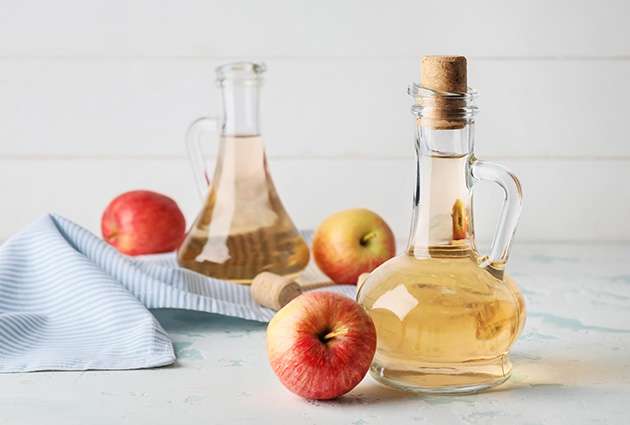How to Improve Immunity and Prevent Disease with the Best Immune Boosters

Your immune system never gets a day off! Whether you are recovering from cold or fighting an infection, your immune system is always active, trying to make your health better. Nutrition plays an important role in nurturing your immunity and Vitamin C is extremely crucial for your immune system. Let us look at the signs of a good immune system and how to improve immunity with different vitamins like vitamins C, E, D, nutrients like iron and zinc that play a part in boosting your immunity.
Signs Of A Strong Immune System
You may have noticed how differently people around you respond to weather changes. While some of your colleagues may develop cold and cough after a sudden shift of weather, you may be well adept at handling these shifts. An enhanced immunity against weather changes, dust and even inflammatory foods is a sign that your immune system may be strong. Your gut is the central point of all your body systems; meaning that healthy digestion and metabolism are the signs of good immunity. If you follow a healthy diet, drink sufficient water and sleep well, chances are that your immunity may be stronger! Eating a varied diet, drinking plenty of water, and sleeping well are all signs of a strong immune system.
How To Improve Immunity: Add These Vitamins To Your Diet
Vitamin C
You’ve probably heard that vitamin C is good for immune system function and for treating colds, but it actually does a lot more. Vitamin C is a potent antioxidant that reduces inflammation in your body, lowering your risk of developing diseases and becoming ill.
Vitamin C, also known as L-ascorbic acid, is a water-soluble antioxidant vitamin. Water-soluble vitamins, unlike fat-soluble vitamins like A and E, are not stored in your body. Extensive research indicates that diets high in vitamin C on a daily basis are associated with a lowered risk of many chronic diseases, including heart disease, certain cancers, eye diseases, and neurodegenerative conditions that affect cognitive health. Vitamin C may also aid in the production and protection of white blood cells, which aid in your body’s ability to fight infections.
Vitamin C sources go far beyond the ever-popular orange or orange juice. This essential vitamin is found in a variety of fruits and vegetables. Citrus fruits, tomatoes, potatoes, strawberries, green and red bell peppers, broccoli, Brussels sprouts, and kiwifruit are natural sources of vitamin C that can act as immunity booster foods.
Vitamin E
Vitamin E is another fat-soluble vitamin with potent antioxidant properties that aid in the production of immune cells. Vitamin E promotes the growth of T-cells, or white blood cells that play an important role in immune function. Vitamin E aids in the growth of those defence T-cells that defend and fight pathogens. Vitamin E, like vitamin C, is a powerful antioxidant that helps your body fight infection. This vital vitamin, which is involved in nearly 200 biochemical reactions in your body, is essential for the proper functioning of your immune system. Vitamin E circulates throughout your body, neutralising free radicals that would otherwise harm fat-containing structures such as cell membranes and brain cells. Vitamin E benefits your skin, hair, eyesight, and immunity in addition to promoting muscle health. Vitamin E, when consumed in sufficient amounts, helps to protect against heart disease, cancer, liver damage, kidney damage, and even macular degeneration, or age-related eye damage. Vitamin E boosts your immunity, keeps you looking young by fighting free radicals, and protects you from the sun. Sunflower, spinach, peanuts, avocado, almonds, hazelnuts, broccoli are some of the natural sources of Vitamin E.
Vitamin D
Vitamin D is known as the sunshine vitamin and is one of the most important and powerful nutrients for immune system support. Vitamin D is one of the only two vitamins that your body can produce on its own (the other being vitamin K), and it can also be obtained through other means such as food or supplements. This vitamin is also a hormone that regulates the amount of calcium in your blood which is required for bone growth and maintenance. While we commonly associate vitamin D with musculoskeletal health, it actually has several functions in your body, including a role in immune system function and inflammation reduction. Vitamin D improves immune cell function by reducing inflammation in your body and decreasing the risk of infection. The best source of Vitamin D is sunlight! According to Harvard Health, aim for at least 15 minutes of sun exposure per day to help maintain healthy levels.
How To Boost Immune System Naturally: Zinc, Iron And Probiotics
Zinc:
Although zinc serves many functions in your body, the characteristics of immune dysfunction as we age are similar to those of zinc deficiency, implying that zinc deficiency could be a major factor in the age-related decline of immune system function. Zinc is required for DNA synthesis and cell regeneration, so highly proliferating cells, such as immune cells, rely on an adequate supply of zinc. Zinc deficiency impairs the growth and function of various immune cells such as macrophages, neutrophils, natural killer cells, T cells, and B cells. Zinc reduces oxidative stress, plays a structural role by stabilising proteins, regulates the expression of many genes, and drives hundreds of chemical reactions in your body, in addition to its role in the immune system. Zinc is also necessary for neurotransmitter release in the brain, as well as insulin secretion. Maintaining your zinc levels may be the key to living a longer, healthier life by optimising immune system function. Zinc, when combined with a nutrient-dense, plant-rich diet, slows ageing and reduces your risk of pneumonia and other life-threatening infections. Nuts and beans are some of the natural sources of zinc.
Iron
Since iron is a major component of haemoglobin, significant bleeding can cause a drop in iron levels. As a result, research suggests that maintaining iron levels and eating iron-rich foods is especially important for menstruating women. Iron, which helps your body transport oxygen to cells, is involved in many immune system processes. It comes in various forms. Heme iron is more easily absorbed by your body. Iron aids in the production of lymphocytes, or white blood cells, which act as the immune system‘s front-liners, fighting diseases and infections by protecting your body from harmful invaders such as viruses and bacteria. Iron deficiency impairs your body’s ability to provide a good immune response, making us more susceptible to diseases. Examples of high-iron-rich foods are beans, lentils, beetroots, cereals.
Probiotics
Probiotics are good bacteria found in your digestive system and they also play a role in improving your immunity. Probiotics promote natural antibodies in your body by increasing immune cell production and fighting infection. Some studies even suggest that probiotics can help prevent respiratory infections like the common cold and flu, as well as reduce urinary tract infections in women. One of the immune system’s functions is to protect us from harmful bacteria. And the beneficial organisms known as probiotics contribute to this effort in a variety of ways. In the gut, a healthy population of beneficial bacteria can combat harmful bacteria, making it difficult for them to thrive. Increasing your intake of plant fibres from vegetables, fruits, legumes, whole grains, and nuts, can provide you with a good source of probiotics.
How To Improve Immunity: Immune Boost By Plix
As discussed above, Vitamin C is the golden vitamin for boosting your immunity! Plix has packed all of Vitamin C’s goodness for immunity, memory boost, heart health and skin health into Immune Boost – Daily Fizz Supplement that improves your immunity in a super tasty way! If you are looking for vitamin C supplements, you should definitely try this one!
Frequently Asked Questions (FAQs)
1. Which are the natural sources of Vitamin C?
Citrus fruits, tomatoes, potatoes, strawberries, green and red bell peppers, broccoli, Brussels sprouts, and kiwifruit are some of the natural sources of vitamin C.
2. What are the benefits of Vitamin C? Why should I consume it?
Vitamin C has been linked to many impressive health benefits, including increased antioxidant levels, lower blood pressure, increased iron absorption, immunity boost, and a lower risk of heart disease and dementia.
3. Why should I consume Immune Boost from Plix?
Plix’s Vitamin C Immune Boost – Daily fizzy effervescent tablets boost your immune system and give you more energy, as the name implies. This product also supports natural detoxification, which helps maintain pH balance and encourage healthy digestion. Furthermore, it is 100% vegan, gluten-free and non-GMO, with plant-based ingredients.
4. Is this product safe for athletes?
Yes, this product is completely safe for athletes to consume. In fact, because intense training frequently causes connective tissue damage, Vitamin C is especially beneficial to athletes. Vitamin C can help you perform better, repair tissue damage, and enhance your immunity.
5. How to consume Immune Boost?
You can take two tablets with one drink. The drink is yummy! Two tablets per day will ensure that you get your daily dose of Vitamin C, which will aid in an immune system boost.














